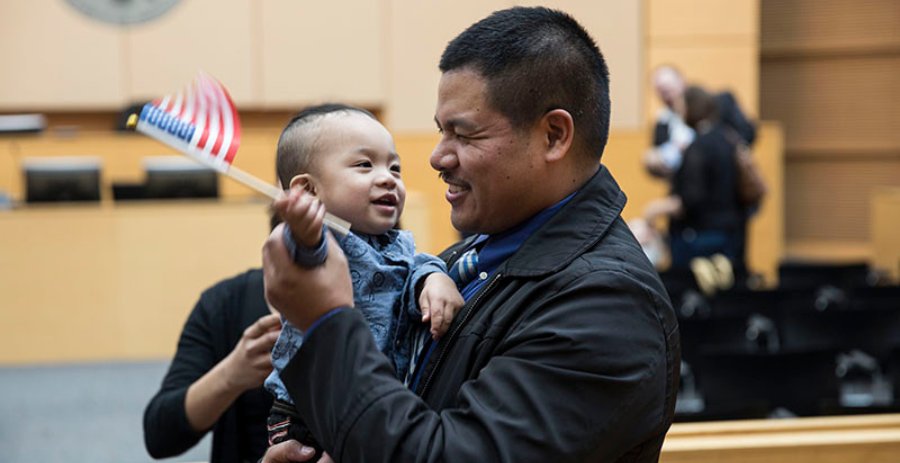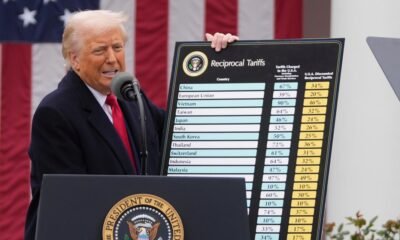2024 Election News
Half a Million Mixed-Status Families in Arizona Brace for Diverging Futures Under Trump vs. Harris Immigration Policies

WASHINGTON – Mario Montoya, a 26-year-old law student in Seattle, reflects on the fear that shadowed his childhood in Mesa, Arizona, due to his undocumented parents. That fear intensified during unsettling moments, such as when his mother was involved in a car accident. “One of my first thoughts was… what if the police asked for her immigration status?” he recalled. Thankfully, after 11 years of uncertainty, his parents recently attained legal status following the Deferred Action for Childhood Arrivals (DACA) program established by former President Barack Obama.
Nationwide, an estimated 22 million people reside in mixed-status households, including over half a million in Arizona alone, according to FWD.us, an immigration advocacy group. In such homes, anxiety is a constant companion, with deportation risks influenced by political climates.
Former President Donald Trump has indicated plans to initiate what he describes as “the largest deportation operation in the history of our country.” This ambition encompasses a population estimated at 11 million undocumented immigrants, potentially affecting another 11 million American citizens who live with them. When directly questioned about deporting individuals with U.S. citizen spouses or children, Trump affirmed that “provisions will be made, but we have to get the criminals out.”
Montoya criticizes Trump’s approach as “inhumane” and fears a return to his presidency could enable harsher immigration enforcement. “He’s going to be more prepared than he was last term to try to enforce what he wants,” he asserted.
In contrast, Vice President Kamala Harris recently announced plans to bolster border security, responding to rising illegal crossings during President Joe Biden’s term. Speaking at a rally in Glendale, Harris outlined a vision for immigration reform that includes both strong border security and a pathway to citizenship, committing to support a bipartisan border bill previously obstructed by Trump. This proposed legislation would increase the Homeland Security budget while limiting asylum requests but offered no protections for undocumented immigrants or extensions for DACA recipients.
Kevin Carreño Wissar, a 21-year-old Glendale Community College student originally from Mexico, expresses skepticism toward both political parties on immigration issues. Having arrived in the U.S. at six years old, Wissar anticipates applying for a green card next year after a lengthy wait. “I would just want there to be a way for anybody here that is considered undocumented to have an actual pathway to citizenship,” he shared.
Another pressing issue arises from Proposition 314, which Arizona Republicans proposed for the November ballot. This legislation could establish illegal border crossings as a state crime, allowing police to arrest individuals unable to prove their legal residency. Previous attempts at similar laws in Texas have faced federal judicial challenges.
Advocates of immigrant rights cite Trump’s previous policies as a warning of potential future actions. Notably, during his administration’s “zero tolerance” approach, thousands of children were separated from their parents. Trump also intensified visa denials and used a public health authority to facilitate mass expulsions during the pandemic.
Conversely, if Harris were to prevail in her political endeavors, advocates like Yunuen Trujillo, a managing attorney at the Coalition for Humane Immigrant Rights, express confidence that family separations would not recur. “Based on what (Trump) did in the past also meant that if there was a denial, that person could be transferred to ICE for deportation proceedings,” she remarked.
Legal experts, including Lynn Marcus from the University of Arizona law school, echo these sentiments. She noted Harris’s emphasis on keeping families together. “Trump’s position has always been that the rule of law is paramount,” Marcus explained, contrasting it with the more compassionate approach she anticipates from Harris.
Undocumented individuals face significant hurdles in pursuing naturalization. Leaving the U.S. often jeopardizes jobs and exposes individuals to violence, complicating the path to a green card. Recent initiatives, such as Biden’s Keeping Families Together proposal, seek to provide some relief by extending legal status to relatives of U.S. citizens. However, judicial interventions have temporarily halted the implementation of these policies.
U.S. Citizenship and Immigration Services reports that the individuals considered under Biden’s new initiative have generally resided in the country for an average of 23 years. Yet, myths persist suggesting that marriage to a U.S. citizen protects against deportation or facilitates obtaining a green card. Marcus dispels this notion, emphasizing the complexities and risks involved in navigating immigration law.
















